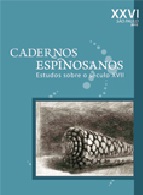Death as a transformation: an approach between Don Quixote and Spinoza’s Ethics
DOI:
https://doi.org/10.11606/issn.2447-9012.espinosa.2012.89461Keywords:
Miguel de Cervantes, Spinoza, Don Quixote, Death, Transformation.Abstract
Miguel de Cervantes (1547-1616), in the last chapter of his book Don Quixote, describes the death of his protagonist caused by the character’s profound sadness. The knight, after being defeated, feels obliged to return to their village and renounce chivalry. The regression for him causes a deep transformation of his reality and his mental state - the sanity of madness – beyond his approximation to his own eternal rest. As Cervantes, the same turning point is seen in Spinoza (1632-1677) at the end of the century. By analogies with transformation and death, the philosopher emphasizes in his Ethics the relationship between the nature of being and its proportion of motion and rest, responsible for human metamorphoses. Based on these considerations, this paper intends to point out the last chapter of the work Don Quixote in connection with the 39th proposition, Part IV of the Ethics written by Spinoza. Similarities involving the concept of death as transformation have been highlighted in both the Spanish writer and the Dutch thinker, since death for both is intimately related.Downloads
Download data is not yet available.
Downloads
Published
2012-06-15
Issue
Section
Artigos
License
Autores que publicam nesta revista concordam com os seguintes termos:
- Autores mantém os direitos autorais e concedem à revista o direito de primeira publicação, com o trabalho simultaneamente licenciado sob a Licença Creative Commons Attribution que permite o compartilhamento do trabalho com reconhecimento da autoria e publicação inicial nesta revista.
- Autores têm autorização para assumir contratos adicionais separadamente, para distribuição não-exclusiva da versão do trabalho publicada nesta revista (ex.: publicar em repositório institucional ou como capítulo de livro), com reconhecimento de autoria e publicação inicial nesta revista.
Authors who publish in this journal agree to the following terms:
a. Authors retain copyright and grant the journal the right of first publication with the work simultaneously licensed under the Creative Commons Attribution License that allows to share the work with an acknowledgment of its authorship and initial publication in this journal.
b. Authors are authorized to take on additional contracts separately, to non-exclusive distribution of the article published in this journal (ex.: to publish in institutional repository or as part of a book), with an acknowledgment of its initial publication in this journal.
How to Cite
Migliari, G. C. G. (2012). Death as a transformation: an approach between Don Quixote and Spinoza’s Ethics. Cadernos Espinosanos, 26, 155-171. https://doi.org/10.11606/issn.2447-9012.espinosa.2012.89461


